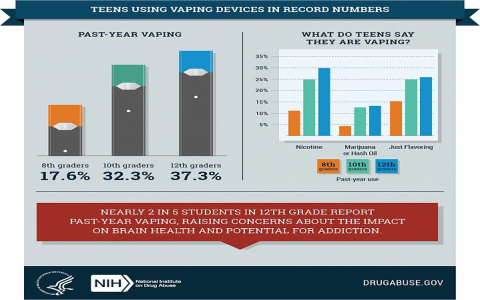Electronic cigarettes (e-cigarettes) pose significant health risks despite marketing suggesting they are safer than traditional cigarettes. The aerosols inhaled contain nicotine, ultrafine particles, flavoring chemicals, volatile organic compounds, and heavy metals, which are harmful to the body.
Established Health Risks
- Nicotine Addiction: E-cigarettes deliver highly addictive nicotine, adversely affecting adolescent brain development and sustaining dependence.
- Respiratory Issues: Inhalation of e-cigarette aerosol causes lung irritation, inflammation, coughing, wheezing, asthma exacerbation, and potentially increases susceptibility to respiratory infections. Severe lung injury (EVALI), strongly linked to vitamin E acetate in THC-containing products and other additives, has resulted in hospitalizations and deaths.
- Cardiovascular Harm: Nicotine exposure significantly increases heart rate and blood pressure, raising the risks of hypertension, heart disease, and stroke.
- Oral Health Problems: Aerosol exposure contributes to dry mouth, gum inflammation, increased oral bacterial growth, and elevated risk of tooth decay and periodontal disease.
- Chemical Exposure Risks: Flavoring agents, even those deemed safe for ingestion (like diacetyl), cause severe lung damage when inhaled (e.g., “popcorn lung”). Formaldehyde and acetaldehyde, carcinogens formed during heating, are present in aerosols.
Additional Concerns
- Gateway Effect: Strong evidence indicates youth e-cigarette use increases the likelihood of initiating traditional cigarette smoking.
- Dual Use: Concurrent use of e-cigarettes and combustible tobacco is common and maximizes health risks, failing to provide harm reduction.
- Device Malfunctions: Batteries can malfunction, leading to fires or explosions causing serious burns and injuries.
Specific Populations
- Youth: Nicotine harms the developing brain, impacting attention, learning, and impulse control. Use during adolescence primes addiction pathways.
- Pregnant Women: Nicotine exposure can damage fetal brain and lung development and increase risks of preterm birth and low birth weight.
Contrary to marketing claims, e-cigarettes are not FDA-approved smoking cessation devices. Evidence regarding their effectiveness for quitting long-term is inconclusive. The safest approach is to avoid all tobacco and nicotine products, including e-cigarettes.









